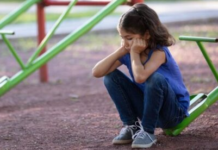Psychologist William Copeland writes for Mental Health Recovery that “bullying can occur at any age and the effects of which remain harmful long after the behavior has been endured.” “We, as a society, are just beginning to understand and come to terms with the havoc that bullying wreaks on the emotional lives of its victims.”
-
Well since Masochistic Disorder got removed from the DSM, this situation seems to be a ripe one for creation of another disorder which will lead to increased drugging. This new mental illness, which psychiatrists are identifying with increasing frequency in clinical practice, will be known as Being Bullied Disorder. The symptoms of this illness will be as follows:
– Diagnosable in children ages 1 day – 18 years
– Child reports, through crying (in preverbal child) or verbalization (older child), being bullied at least 2 times in one week, or at least 4 times in one month, or 10 times in 3 months.
– The child’s response to the bullying appears out of proportion to the precipitating stimulus. This is what differentiates a Serious Being Bullied Illness (SBBI) from a normal response to bullying.
The primary treatment for this disorder is antipsychotic drugs which serve to stabilize mood and promote normal responses to bullying.
The APA encourages parents to bring their child in for evaluation by a psychiatrist if they suspect abnormal responses to bullying; your child may have Being Bullied Disorder and we may be able to profit from drugging them. Thank you.
-
I experienced social bullying in the system, because I genuinely shared my authentic feelings. I thought that was how it worked. I had no idea that my vulnerability would turn against me among ‘compassionate healers.’
What I realized is that I was surrounded by neither compassion nor healers, but by extremely narcissistic bullies who called themselves either ‘therapists’ or ‘social workers.’ As I always like to say, it wasn’t 100%, but it was a big enough pocket for me to call it, undoubtedly, systemic. Not enabling the abusive authority would be considered dissidence and seemed practically unthinkable to staff, so, really, it was a bullying system.
Indeed, it took a while to get over this, mainly because it was insidious and I wasn’t altogether aware of what was happening in the moment. Last thing I expected from ‘mental health’ professionals and social service staff was this kind of blatant and reckless emotional exploitation.
Eventually, I realized it was standard procedure, to keep people in line and compliant. I was independent and transparent, and that made me a perfect target for social bullying. After all, I was a client of the system. Who did I think I was, an actual thinking person??
But once I got perspective on these dynamics and learned how we attract this, as well as how it is a clear reflection of a toxic society, then I became resilient to it. In fact, it explained a great deal of this ‘mental illness’ thing to me, I got a lot of insights about my own issues with family, and how this was translating in this environment, that same feeling of powerlessness and disorientation.
So really, it was healing at the core, when I got the meaning from my experience playing the ‘victim role.’ I didn’t identify with it, but I did play the part, no doubt.
I may still feel a bit ganged up on, on occasion, when I stand alone in my truth, but I expect that as an activist. Perspective and resilience makes it easier to take risks. I’ve been putting my voice of truth about the system and mental health/illness out there for a long time, I’ve taken a lot of hits for being so open, despite the fact that it’s always moved me forward at quantum leaps. So it’s been a big lesson in seniority over the judgments of others, and also in trust.
Bullies are incredibly insecure people who act tough, because they want others to see them that way; but in reality, they are scared to let their guard down for fear of feeling their own vulnerability. And they hate truth, light, and the courage to be humble. Takes courage and humility to face bullies and bullying systems with truth, but it’s vital to do so in order to disempower these saboteurs of progress, healing, and social change, in favor of maintaining their own power over others. When we face the bullies, we invite radical change to happen.














